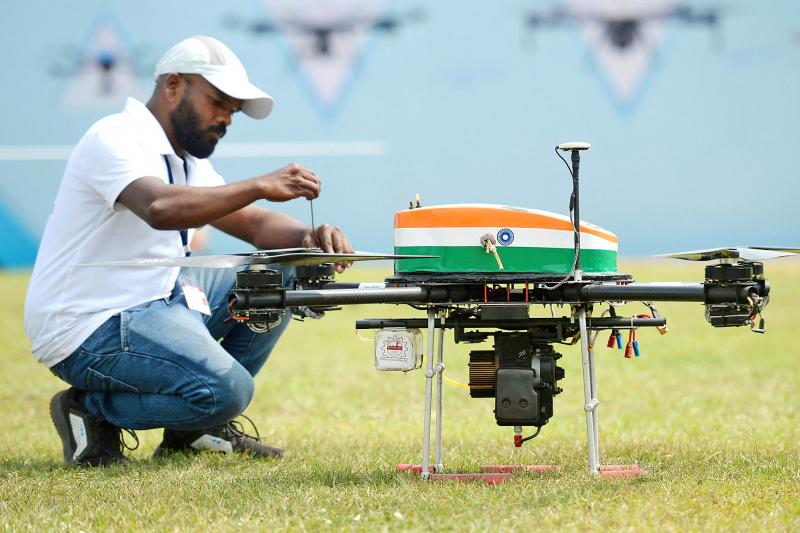India has banned the import of drones, a move that effectively blocks an emerging market for China’s SZ DJI Technology Co (大疆創新), the world’s top drone maker, and encourages a nascent local industry to increase production.
Import of some drone components is to be allowed without approval, the Indian Directorate-General of Foreign Trade said in an order late on Wednesday.
Drones used for research and development, defense and security purposes would be exempt from the ban, the government said.

Photo: AFP
Amid the continuing disputes between China and US, drones have taken center stage as concerns surface that Shenzhen, China-based DJI might be relaying some sensitive data to Chinese intelligence agencies on everything from critical infrastructure, such as bridges and dams, to personal information, such as heart rates and facial recognition.
India last year relaxed rules on the use of drones to make it easier to acquire licenses and allowed heavier payloads, so the devices can potentially be used as uncrewed flying taxis.
India is to offer 1.2 billion rupees (US$16 million) of incentives for drone makers under Indian Prime Minister Narendra Modi’s US$20 billion plan to lure the world’s biggest brands to make their products in India and export them to the world.
Rattanindia Enterprises Ltd, a local drone maker, said that India’s move would help to make the nation a drone manufacturing hub.
The new rules would allow better efficiency in supply-chain operations, inventory and fund management, the company said in a statement yesterday.
The pandemic has intensified a shift to automated delivery for meals, groceries, medical supplies and other essentials, boosting the drone industry.
Autonomous-vehicle firms, delivery start-ups and drone operators have touted the benefits of contactless systems.

GREAT SUCCESS: Republican Senator Todd Young expressed surprise at Trump’s comments and said he expects the administration to keep the program running US lawmakers who helped secure billions of dollars in subsidies for domestic semiconductor manufacturing rejected US President Donald Trump’s call to revoke the 2022 CHIPS and Science Act, signaling that any repeal effort in the US Congress would fall short. US Senate Minority Leader Chuck Schumer, who negotiated the law, on Wednesday said that Trump’s demand would fail, while a top Republican proponent, US Senator Todd Young, expressed surprise at the president’s comments and said he expects the administration to keep the program running. The CHIPS Act is “essential for America leading the world in tech, leading the world in AI [artificial

DOMESTIC SUPPLY: The probe comes as Donald Trump has called for the repeal of the US$52.7 billion CHIPS and Science Act, which the US Congress passed in 2022 The Office of the US Trade Representative is to hold a hearing tomorrow into older Chinese-made “legacy” semiconductors that could heap more US tariffs on chips from China that power everyday goods from cars to washing machines to telecoms equipment. The probe, which began during former US president Joe Biden’s tenure in December last year, aims to protect US and other semiconductor producers from China’s massive state-driven buildup of domestic chip supply. A 50 percent US tariff on Chinese semiconductors began on Jan. 1. Legacy chips use older manufacturing processes introduced more than a decade ago and are often far simpler than

Hon Hai Precision Industry Co (鴻海精密) yesterday said that its research institute has launched its first advanced artificial intelligence (AI) large language model (LLM) using traditional Chinese, with technology assistance from Nvidia Corp. Hon Hai, also known as Foxconn Technology Group (富士康科技集團), said the LLM, FoxBrain, is expected to improve its data analysis capabilities for smart manufacturing, and electric vehicle and smart city development. An LLM is a type of AI trained on vast amounts of text data and uses deep learning techniques, particularly neural networks, to process and generate language. They are essential for building and improving AI-powered servers. Nvidia provided assistance

Gasoline and diesel prices this week are to decrease NT$0.5 and NT$1 per liter respectively as international crude prices continued to fall last week, CPC Corp, Taiwan (CPC, 台灣中油) and Formosa Petrochemical Corp (台塑石化) said yesterday. Effective today, gasoline prices at CPC and Formosa stations are to decrease to NT$29.2, NT$30.7 and NT$32.7 per liter for 92, 95 and 98-octane unleaded gasoline respectively, while premium diesel is to cost NT$27.9 per liter at CPC stations and NT$27.7 at Formosa pumps, the companies said in separate statements. Global crude oil prices dropped last week after the eight OPEC+ members said they would